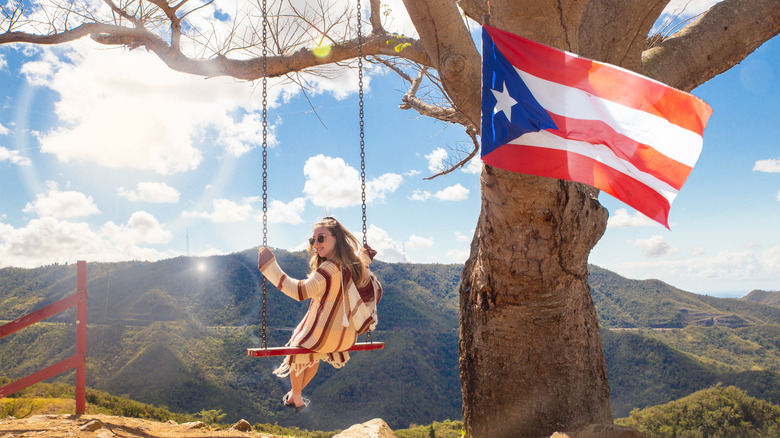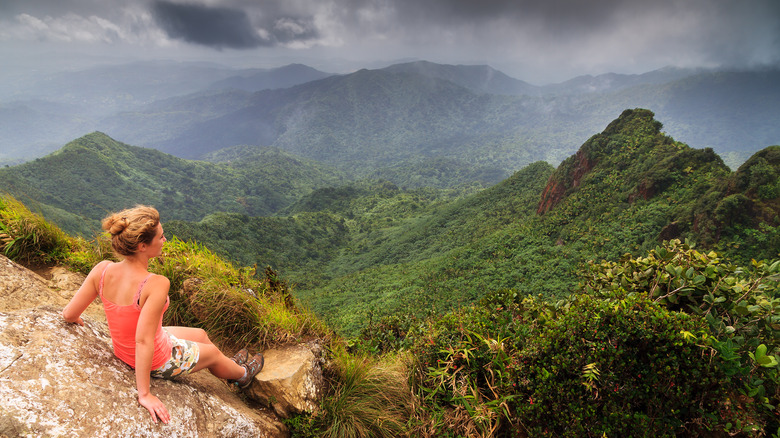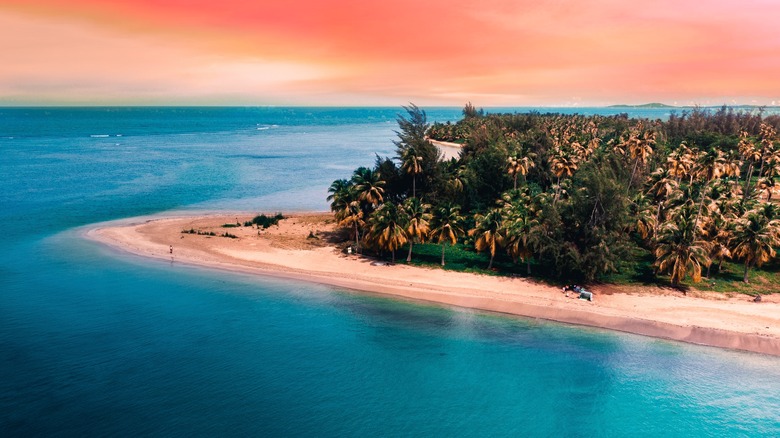How To Be A Considerate Tourist When Visiting Puerto Rico
Puerto Rico is a much-loved destination for American travelers. Beyond the fact that U.S. citizens don't need a passport to travel there, the island is a great way to get the feel of a tropical getaway without having to go very far or exchange money. However, in the last few years (or the last few decades, if we're being honest), Puerto Rico has not been given the respect it deserves nor the care it so desperately needs.
You may remember in 2017 and 2022 when the territory was hit by Hurricanes Maria, Irma, and then Fiona. These natural catastrophes caused unprecedented damage to Puerto Rico's infrastructure, including their power grid which took 11 months to restore. The island's government estimated it would require nearly $132 billion to repair the damages, of which they have received only a fraction.
And if that wasn't bad enough, in the middle of these events, COVID-19 happened and Puerto Rico was swarmed by tourists looking for an escape from pandemic restrictions they faced back home. Even though Puerto Rico required masks, some visitors took a rules-for-thee-not-for-me approach. Now as the pandemic subsides and the island continues to rebuild, a question arises. How can we, as tourists, do better?
How to travel responsibly in Puerto Rico
Leave it better than you found it. Just a step above "leave no trace," this rule of conservation is globally espoused to encourage individuals to be more conscious of their impact on nature. Don't scour the trees with your and your lover's initials. Don't throw trash into the streets. Don't take pieces of rock or shells home from a beach that explicitly forbids it.
However, "leave it better than you found it" goes beyond the effects we have on our environment at home. It also applies to the places we travel. This is treating locals in Puerto Rico with respect, following the local laws and regulations, supporting locally owned establishments, and being an informed traveler. These are all things you can do to leave behind you a better impression of tourists from your country than those before you.
If you're traveling to Puerto Rico, consider lending a hand directly to a good cause. There are numerous volunteer opportunities throughout Puerto Rico where you can help local communities in a variety of ways.
You should also make sure the money you're spending is staying in the local economy. You can do this by buying food from local fishers, farmers, and restaurant owners and purchasing gifts made and distributed by local artisans. Lastly, when booking your accommodations, take the extra step to ensure it is independently owned. There are a variety of eco-conscious accommodations like this in Puerto Rico, so take your pick!
Support Puerto Rico by being informed
There are many ways to be a responsible traveler in Puerto Rico that go beyond just spending your money wisely. Learning a bit about the history of the island and current hardships communities are facing can make us all a bit more empathetic to the destinations we visit and the people who live there.
Puerto Rico, much like the mainland U.S., is a melting pot of cultures and ethnicities that include the Indigenous Taínos, Spanish, and African communities. This has led to an intermingling of cultural traditions that you can see and experience in every corner of the island. Don't make the mistake of missing out on local Indigenous food traditions or try your hand (or rather feet) at some Afro-Caribbean dance classes.
With such beautiful traditions also comes a respect for the local nature and wildlife. Puerto Rico is full of green tropical rainforests, stunning sandy beaches, sapphire blue waters, and the colorful fauna to match. Locals rely heavily on local ecosystems to support their own livelihoods as well as keep tourists coming back year after year.
It's estimated that the coral reefs alone generate $1.4 billion in revenue from tourism. So, be sure to book a snorkel or dive tour of the reefs with a responsible tour operator and wear your reef-safe sunscreen. You may also want to consider donating to the Nature Conservancy which works with local fishermen to promote more sustainable fishing methods and preserve food traditions.


